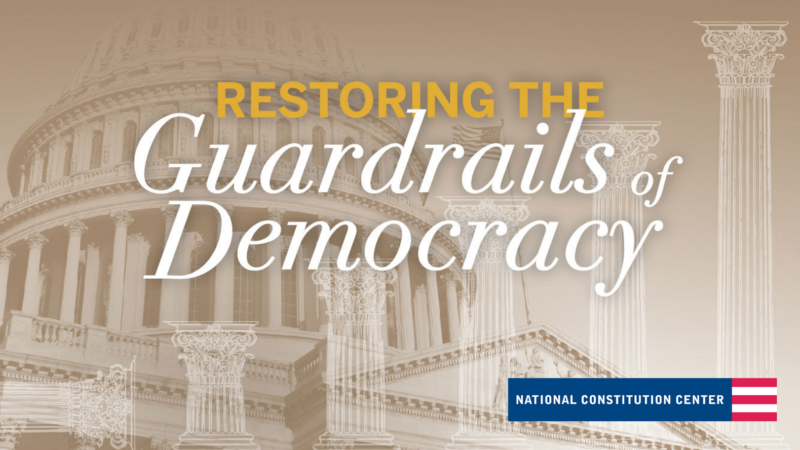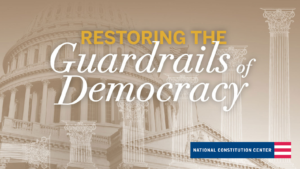

As Walter Olson has noted, one of the beneficial aspects of this Guardrails of Democracy project organized by the National Constitution Center is the considerable common ground shared by the three separate teams, each approaching the topic independently from different philosophical perspectives. This convergence on some core beliefs about what's essential for safeguarding democracy at this moment of peril might even be characterized as the kind of "overlapping consensus" that John Rawls argued was necessary for political liberty, equality, and democracy to exist under conditions of philosophical pluralism.
In an effort to further this spirit of conciliation, I will identify three additional points of agreement concerning our mutual goal of safeguarding democracy from the forces that presently threaten it in the United States:
Broaden as Wide as Possible the Democracy-Protection Coalition
Walter worries that use of the terms "Big Lie" and "election denialism" are counterproductively off-putting, alienating conservative-minded and Republican-affiliated "ordinary" citizens who otherwise could be recruited to the democracy-protecting cause. Walter offers "election fabulist" as a less objectionable label for the same "incredibly dangerous" phenomenon. I'm happy to pragmatically use the more diplomatic term if that will help achieve the objective of preventing the repudiation of valid election outcome by partisans who simply refuse to accept defeat.
Moreover, this kind of terminological restraint is an instance of a more general point: even if "electoral skepticism" (how's that for an even more diplomatic phrase?) over the outcome of the 2020 election is utterly unwarranted based on all the evidence, as Bill Barr among others have observed, it would be wise to consider bolstering those procedures that would help convince election skeptics of the validity of vote totals in the future. Thus, measures to make the process even more transparent and less vulnerable to misinformation—like counting mailed ballots quickly and permitting robust observation of the counting process by representatives of the competing candidates and political parties—should be maximized to the greatest extent possible.
Still, there is a limit to this strategy. If Donald Trump and/or some of his allies attempt to repudiate the valid outcome in any of the hotly contested midterm elections, in the same way that Trump attempted to negate his 2020 loss to Joe Biden, it will be necessary to oppose that effort at election subversion with all the forces available to defenders of democracy. It will not be a moment for linguistic niceties. Rather, plain-spoken bluntness about the repeated refusal to accept electoral defeat will be needed. This point of course would be equally true if it were Democrats, rather than Republicans, refusing to acknowledge the validity of the other side's victory. But realistically, there is more reason to fear at the moment that some of the Republican midterm candidates—like Kari Lake running for governor in Arizona—may be unwilling to concede defeat if the vote tally is against them, than if the same is true for their Democrat opponents.
Ultimately, it is imperative that enough Americans of good will—Republicans, Democrats, and independents (as Liz Cheney said)—are willing to abide by the results, whatever they are. The midterms will be a test of our current capacity to perform this crucial small-d democratic function. Any additional ideas on how to improve our prospects for success on this front would be most welcome.
Let States Choose Which Majority-Winner System They Prefer
Walter also prefers the "plain vanilla" version of Ranked Choice Voting, otherwise known as the "instant runoff" version, to the "round robin" alternative. He fears that round-robin voting is "more complex" than "today's America" can handle. I could argue that the round-robin method of identifying a winner from ranked-choice ballots is actually simpler and more straightforward than the instant-runoff method, especially for Americans familiar with round-robin scoring in sports. But it's not necessary, or productive, to have that debate here.
Instead, as part of the project of finding common ground in the defense of democracy, all of us should embrace a move to majority-winner elections, leaving to states the choice of which particular majority-winner system they wish to adopt: instant runoff, round-robin, or another alternative, including the kind of "top two" system used in California, which doesn't even require ranked-choice ballots. Anyone, like Walter, who favors instant-runoff voting over the status quo ought to favor the congressional adoption of a majority-winner requirement for congressional elections. Walter may be right that ranked choice voting, or electoral reform more broadly, won't eliminate the risk of election subversion (to use that particular term). But there is already evidence from this year's midterms—including Sarah Palin's loss under Alaska's new instant runoff system—that more extreme candidates, like those espousing "election fabulist" positions, have greater difficulty prevailing in majority-winner electoral systems. Therefore, it should be a high priority for the democracy-protection coalition to urge enough Republicans as well as Democrats in Congress to enact a majority-winner rule that would cause states to choose among the many majority-winner alternatives that are all more democracy-protecting to the existing plurality-winner systems that most states use.
Jumpstart a Discussion on Reinvigorating Civics Education
Walter rightly acknowledges the danger that the government's effort at civics education can turn into "taxpayer-funded propaganda" but he still believes that improved civics education is a worthwhile pursuit. I too see no alternative to an attempt to resuscitate a national conversation on the shared precepts of democracy that should form the basis of every American's education for citizenship. Even if in our currently polarized environment there are sharp disagreements among citizens about what democracy entails, we need to have this conversation. We cannot possibly undertake self-government together as Americans unless we embrace some common conception of what self-government is and how it is to be conducted.
This brief follow-up to our initial round of Guardrail essays is not the place for a detailed discussion of what a revitalized civics education would entail. Indeed, precisely because the contents of a proposed civics education would be contested, there should be no claim of imperiously dictating the curriculum to those who would object. Instead, what is essential is to have a serious, good-faith, and ongoing dialogue about what that curriculum should include.
I have faith that if that kind of dialogue occurs, it would be fruitful. The essential elements of a democracy, while contestable to some degree, inevitably have some core components to be mutually discoverable. Democracy is not an infinitely malleable concept, which ultimately has no core meaning. Instead, "government of the people, by the people, and for the people," as Lincoln so memorably put it, has an irreducibly common understanding for all Americans. We need to remind ourselves of what that common understanding is, so that it indeed does not perish.
The post Three Points of Agreement on Democracy Protection appeared first on Reason.com.







